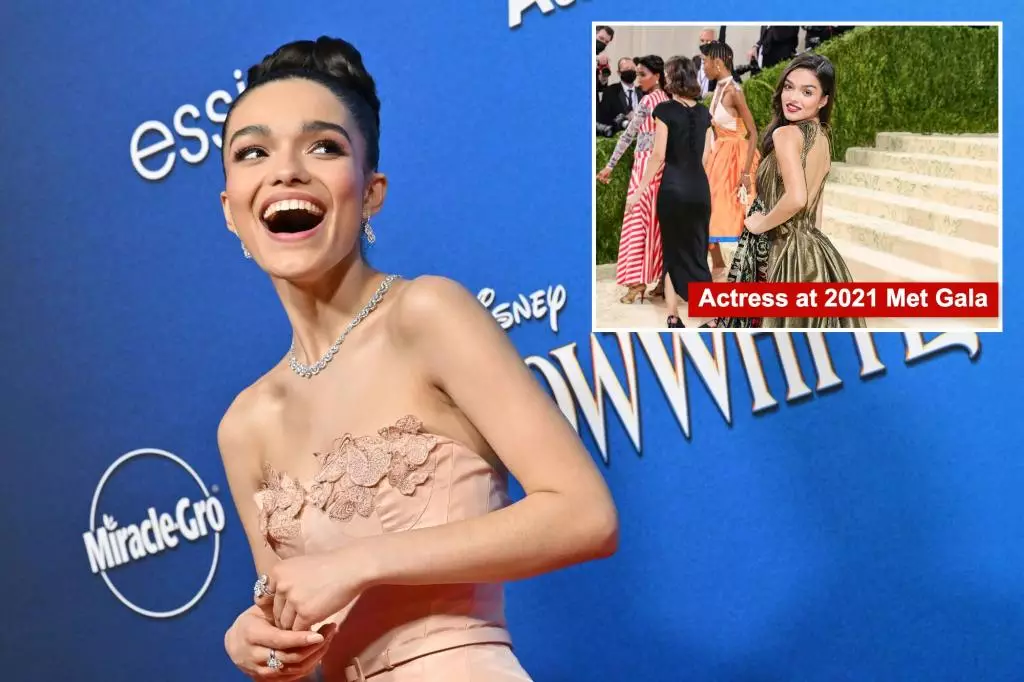Rachel Zegler, the controversial star of Disney’s latest live-action adaptation of “Snow White,” has found herself in the whirlwind of public scrutiny and media attention. Her recent invitation to the prestigious Met Gala, a hallmark event in the fashion calendar, serves as a testament to her rising star power and the complex web of complexities that surround her. However, the hotly anticipated event in May is likely to see her missing from the glitzy red carpet due to prior commitments in London for her upcoming role in “Evita.” While many would consider a Met Gala invite a feather in their cap, for Zegler, the implications are layered with the baggage of past controversies that shadow her ascent.
The Price of Outspoken Opinions
Zegler’s trajectory has been tinged with controversy from the get-go. With a significant social media following, she has not shied away from expressing her views, often inviting backlash. The backlash following her comments on the character dynamics in “Snow White” has not only cost her public favor but also affected the film’s reception. Critiques of her stance—calling out the Prince as a “stalker”—alienated a segment of fans who hold the original 1937 animated classic dear. Additionally, her politically charged statements on social media, particularly surrounding the Israeli-Palestinian conflict and American politics, added fuel to the fire, resulting in a broader discussion about the role of celebrities in public discourse.
While many artists leverage their platforms for advocacy, Zegler’s approach has ignited a debate about the consequences of irreverent commentary. Did she overstep, or was she simply exercising her right to speak out? This conflict mirrors a larger societal conversation about artistic freedom versus personal responsibility, complicating how fans view her evolution in Hollywood.
Fashion and Fame: The Met Gala as a Barometer
The Met Gala is often referred to as the “Oscars of Fashion,” showcasing not just style but also the cultural zeitgeist of the moment. As incoming guests eagerly anticipate Anna Wintour’s stamp of approval for the invite list, Zegler’s absence this year could be symbolic. While her contemporaries like Shakira, Lizzo, and LeBron James bask in the limelight, Zegler treads carefully amidst the tangled vines of public relations and personal choice. Her choice to prioritize rehearsals over a glamorous night reflects a dual commitment: to her craft and to navigating the fallout of social media missteps.
The theme for this year’s gala, “Superfine: Tailoring Black Style,” intrigues fashion enthusiasts and presents an opportunity for designers and attendees alike to reflect on cultural identity in contemporary fashion. With an exciting cohort of co-chairs, including Colman Domingo and A$AP Rocky, this year’s event promises to spotlight a rich tapestry of Black creativity. Zegler’s absence might put her artistic choices under a microscope—both for what she misses and what she prioritizes.
From Controversy to Opportunity: The Fallout of Snow White
Despite her ongoing controversies, Zegler’s career trajectory illustrates a larger paradigm shift within Hollywood—the balancing act of risk and reward. Her involvement in the heavily criticized “Snow White” adaptation, which has been marred by accusations of misrepresentation and overspending, signifies an evolving landscape for Disney. As the film industry pushes toward more progressive narratives, the backlash Zegler faced is emblematic of the sensitive terrain artists must navigate today.
The fallout from the film, with reported losses of $115 million, serves as a cautionary tale about the precarious nature of high-profile projects and the impact of an actor’s public persona on a film’s financial success. Zegler’s comments and actions over the past months signify more than just personal beliefs; they reflect broader industry tensions regarding representation, diversity, and public engagement.
A Balancing Act: Fame, Freedom, and Future Endeavors
As Rachel Zegler prepares for her next grand stage in London’s West End, the weight of her past decisions remains a shadow over her blossoming career. Will her outspoken nature serve as a springboard for more substantial roles, or will it alienate potential collaborators due to fear of public backlash? As the entertainment industry continues to grapple with its ever-changing cultural narratives, Zegler finds herself in the thick of the dialogue about art, activism, and the responsibility that comes with a platform.
The dual nature of her persona—a talented singer and actress, yet a figure marred by controversy—leaves audiences with a lingering question: can Zegler seize the narrative and reshape herself into a beloved public figure, unapologetically owning both her artistry and her opinions? The coming months will likely reveal much about not just her career, but also the evolution of how celebrity and activism intersect in the modern age.

